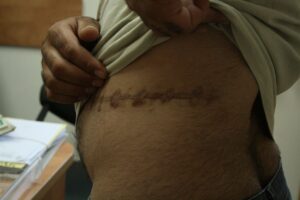Blog by Gabriella Nilsson and Susanne Lundin
At the backdrop of high-income countries’ hoarding anti-COVID-19 vaccines, let us problematize how the “needaches” of individuals in high-income countries are satisfied at the expense of the health and wellbeing of individuals in lower-income countries. While the health inequality gap is well known, and a basic premise of international initiatives such as the Agenda 2030, it is rare that the focus is on the causes of this gap and on those responsible for it. It is not explicitly articulated that sometimes increased health and wellbeing for some assumes decreased health and wellbeing for others.

In our previous and ongoing research on sexual violence, the infertility industry, organ trafficking, clinical trials and the spread of falsified pharmaceuticals in various parts of the world[i],[ii], we have shown that wealthy individuals satisfy their needs and aches for improved health and well-being by purchasing bodies, body parts and bodily practices from deprived individuals, hereby overlooking, or violating, geographical, legal and moral boundaries. Here we introduce the term “needache” to elaborate these findings of how unequal distribution of health entitlements are negotiated and legitimized by individuals, organisations and societies. The term emerges from the Swedish slang expression “villhöver.” It includes the insight that what the individual perceives as an actual need for something—an organ, a child, sex, a vaccine—can in fact be regarded (by others and partly by the individual herself) as a less legitimate, immoral or even illegal want or ache. Even with the recognition of this paradox the individual is not necessarily ready to abstain from the perceived need but proceeds with a transaction to satisfy it.
We have found that different levels of needache could be imagined, such as “illness needache”, where the individual is in acute need of an organ or a medicine for his or her survival, or where the researcher is driven to develop new medications or vaccines; “everyday needache”, the felt need for self-improvement or temporary satisfaction through, for example, sexual acts; and “existential needache”, the perceived need for self-fulfilment by, for example, becoming a parent. By introducing the term needache in this blog post, we want to highlight, and encourage further ethnographic research on how perceptions of entitlements to health and wellbeing involve the co-construction of supposedly objective, biological human needs; the individual’s culture-driven desires, dreams and aspirations; and hierarchical, colonialist notions of the different value of human beings.

Let us mention a few issues where this is relevant.
Although criticized for exporting the risk of research to those who will not be able to afford the resulting medical products, clinical trials are increasingly outsourced to low-income countries. Ethics dumping perpetuates the inequality between high- and low-income countries following patterns established in colonial times. It is the fewer regulatory safeguards and high levels of poverty and illiteracy that provide “willing” volunteers in clinical trials. Simply put, choice, as in informed consent, is a risky notion in countries where people lack access to medical care and are struggling to put food on the table.
The live-streaming of child sexual abuse is on the rise in many parts of the world. It involves the one who orders, pays and watches the abuse, typically wealthy customers from countries with strict legislation; the one who commits the abuse on the spot, often mothers in lower-income countries who feel that no harm is done to their child as there is no direct contact with the perpetrator; and the child subjected to the abuse. The main fostering factor is poverty, and the opportunity for financial gain has meant that people have invested their savings on computers and that neighbours have joined forces to pay for more efficient online connections.
Supply and demand for children is a strong driving force in intercountry adoption, and the flow of children is one-way. It is primarily resourceful persons from high-income countries that adopt children from lower-income countries and thus it has become increasingly politicized and viewed as a remnant of outdated colonial power structures. Although it is reported that poor mothers have been pressured to give up their children for adoption, or that their children have been stolen from them, a ban on international adoptions is neither considered realistic nor desirable in many high-income countries.
Now, what is the commonality of these three issues, all situated in highly diverse moral contexts and jurisdictions, where, for example, child sexual abuse is a criminalised action in most countries and adoption a valued family form? With the term needache, we want to emphasize the benefits of viewing seemingly disparate issues like these and others, with their various circumstances, histories and geographies, as part of the “the same” problem in terms of increasing the health inequality gap. Instead of directing the searchlight solely at the effects on individuals and societies of being exploited and victimised, we stress the need to explore, empirically, how health-related exploitation works and is legitimized by individuals or organisations in high-income countries, and with what consequences for the morality of those fulfilling their needaches at the expense of others, as well as for the policy and legislation of their societies at large.
We ask readers to consider the following questions: Why do health promotion measures, such as those set out in the Agenda 2030, almost exclusively involve unidirectional changes wherein high-income countries reach out to help lower-income countries? How come the same commitment is not shown in the opposite direction of unequal health, in directing the searchlight “back home” at those individuals and organisations causing health problems and decreasing the wellbeing of individuals in lower-income countries? We argue that a focus is needed, in research, as well as in international policy and regulation, on health/ill-health as an intertwinement of hierarchically and globally separated health entitlements, money-flows and jurisdictions. More concretely, a goal for the UN and other stakeholders should be to explore, and develop methods for how needs can be prioritized before needaches in an unequal world. Let us hope that our gained experiences of the covid-19 pandemic has opened up this possibility.
Works Cited
[i] Nilsson, G. (2020). Towards voluntariness in Swedish rape law: Hyper-medialised group rape cases and the shift in the legal discourse. I Bruvik Heinskou, M., Skilbrei, M.-L. & Stefansen, K. (eds) Rape in the Nordic countries. : Continuity and Change. Routledge Research in Gender and Society, (pp. 101-119), 84. Routledge.
Nilsson, G. & Lövkrona, I. (2020). Våldets kön: Kulturella föreställningar, funktioner och konsekvenser. Studentlitteratur AB.
Andersson, U., Edgren, M., Karlsson, L. & Nilsson, G. eds (2019). Rape Narratives in Motion. Palgrave studies in crime, media and culture. Palgrave Macmillan.
Nilsson, G. (2019). Rape in the news: On rape genres in Swedish news coverage. Feminist Media Studies, 19, 1178-1194. Taylor & Francis.
[ii] Liu, R and Lundin, S. (2020) Medicines in the grey market: A sociocultural analysis of individual agency. Movement of knowledge: Medical humanties perspectives on medicine, science, and experience. Hansson, K. & Irwin, R. (eds). Lund: Nordic Academic Press, s. 233-258 25 s.
Lundin, S. et al (eds) (2016). Global Bodies in Grey Zones: Health, Hope, Biotechnology. Stellenbosch: African Sun Media.
Lundin, S. (2016). Organs for Sale An Ethnographic Examination of the International Organ Trade. Palgrave Macmillan. (Palgrave Pivot)
Lundin, S., Torkelson, E. and Petersen, M. (2016). “With This Disease, You Take Whatever Chances There Are”—A Study on Socio-Cultural and Psychological Aspects of Experiments Regarding Huntington’s Disease. Open Journal of Medical Psychology , 5, 72-87.
Lundin, S. (2012). “I Want a Baby; Don’t Stop Me from Being a Mother”: An Ethnographic Study on Fertility Tourism and Egg Trade. Cultural Politics, 8 (2): 327–344.
Gabriella Nilsson is an associate professor in ethnology at the Department of Arts and Cultural Sciences, Lund University, Sweden. Her research focuses on social and cultural aspects of care, children’s health, aging and sexual violence.
Susanne Lundin is a professor in ethnology at the Department of Arts and Cultural Sciences, Lund University, Sweden. Her research includes social and cultural aspects on health and medical technologies with a focus on moral and legal grey areas.